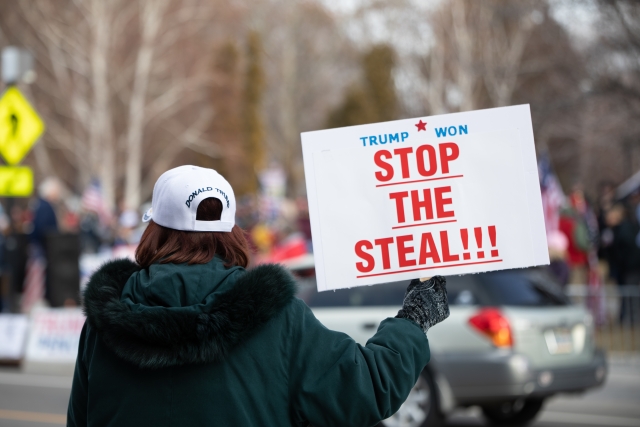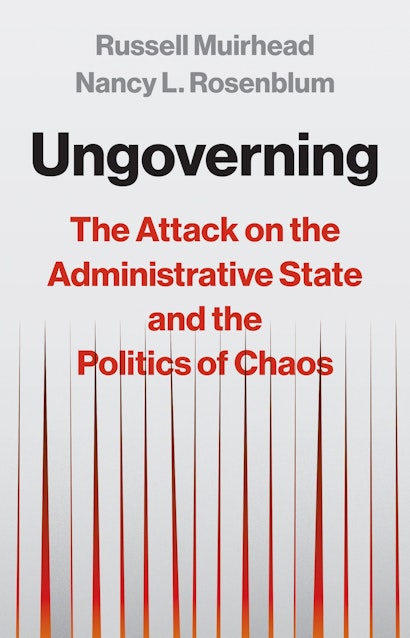“I want to bring everything crashing down” is the manifesto of a master of chaos, Steve Bannon, whose desire to destroy captures the core goal of Donald Trump, his movement, and the party he has come to define.
There is almost no precedent for this in the annals of political history. The idea that those entrusted with responsibility for governing a democracy would intentionally make the state less capable—degrading its ability to collect taxes, to deliver mail, to conduct diplomacy, to prosecute violations of civil rights—is almost unthinkable.
We call this “ungoverning.” It is an unfamiliar name for an unfamiliar phenomenon: the attack on the capacity and legitimacy of government, especially the part that goes by the name “administrative state.” It comprises a vast array of government agencies in which officials specifically charged with the task shape, implement, adjudicate, and enforce public policies of every kind. It encompasses all those who carry on the day-to-day work of government: the ordinary and routine, the wars and emergencies. The legislature may pass bills, the executive may sign them, the judiciary may pass judgment on them—but it is the appointed officials and civil servants who translate laws on paper into action.
There are horrific examples of failed states incapable of performing even the most elemental tasks of providing security to their inhabitants. And there are instances of authoritarians who destroyed once-successful states, like Hugo Chávez and Nicolás Maduro in Venezuela who made a once prosperous state so uninhabitable that millions of Venezuelans have left their country in search of any other place to live. It is possible to “bring it all crashing down.”
Americans have suffered a close encounter with the unanticipated and dangerous disabling of government during Donald Trump’s first presidential term. He clarified it as no one else could by forming the first presidential administration that was anti-administration. This was not just provocative talk. Procedures for decision-making were circumvented, experts were silenced or fired, and public purposes were abandoned, without any justification beyond thwarting “enemies” who opposed the president’s will. Ungoverning is the intentional disruption of regular order for reasons unrelated to public welfare.
It is the substitution of personal will for governing. Governing authority adheres to an office, whereas rule is about empowering the will of a particular person. Invoking a medieval image, it is the difference between the crown and the king’s head on which the crown sits. “My generals” is not a colloquial way of saying that the military is subservient to civilian authority. It is a demand for unconditional obedience, submissiveness. Candidate Trump calls for Obama to be subjectd to military tribunals.
Ungoverning works by disabling, hijacking, circumventing, and derailing departments and agencies. There is nowhere it cannot go. We’ve witnessed this chaos: sidelining senior officials and diplomats in the State Department even at high-level meetings with adversaries like North Korea’s dictator Kim Jong Un; demanding personal loyalty and special treatment for favorites from the director of the Federal Bureau of Investigation; threatening to deny Covid aid to states whose governors were critical of the president. Ungoverning subverts the National Oceanic and Atmostpheric Association ‘s forecast of Hurricane Dorian’s path. Hobbles the Postal Service. Hijacks the Justice Department to take personal control of prosecutions. There is even the threat to abolish the Internal Revenue Service, as if any government could function without steady and sufficient revenue.
The imperative is to transform office into rule. Not to rollback unsuccessful programs, not to turn to the market instead of regulation in specifies domains, not to reform for greater efficiency but to “bring it all crashing down.”
Why would a president declare war on the machinery of government? The purpose is clear: to throw off the constraints that administration imposes on the exercise of personal power. The justification is that only unimpeded personal power can overcome a conspiracy threatening the nation: the malignant “deep state.”
The most visible locus of ungoverning is elections. “Stop the steal” aims to subvert the results of elections through attacks on the administration of elections. There is nothing metaphorical about “attacks”. They include intimidation and physical assaults on the state officials, the seasoned experts, and the volunteers who register voters, distribute ballots, collect and count them, certify results. Today, elections at every level of government are vulnerable to deliberate delay and distortion. Ungoverning strikes the beating heart of democracy.
Although Trump’s presidency clarified it as none other, it did not come out of nowhere. He brought decades of cultivated hostility toward government to a crescendo. Decades during which a conservative Republican Party was transformed into an extremist party unable and uncommitted to governing.
Two developments have increased the danger. In June of 2024 a majority of justices on the Supreme Court declared the administrative state in violation of the constitution by usurping all three fundamental government powers: executive, legislative, and judicial. The Court abandoned forty years of deference to the legislature and administrative state and claims for itself not only judgments on whether the FDA or EPA has overstepped their bounds but claimed the sole prerogative “to say what the law is”. The Court also dramatically declared virtually unlimited presidential immunity for actions performed during his or her time in office.
The second expansion of ungoverning is the 2025 Project Mandate for Leadership. At its heart is a plan to destroy the administrative state, including the elimination of civil service protections for government workers. While Trump has distanced himself from the full compendium of policy goals in Project 2025, the project of “deconstructing the administrative s” defines contemporary “conservatism.” If government is the problem, get rid of government.
Ungoverning has a constituency. It will have a future after him. It is not the work of one person. J.D. Vance is very dangerous— intelligent, disciplined, and a fervent Christian Nationalist with powerful backers in the wings. Ungoverning has migrated to the states, where governors and other elected state officials carry on the business of degrading the machinery of government. If Trump loses the 2024 election the assault on governing can be carried on – by a rogue political party, a reactionary social movement, and cooperative, life-tenured justices of the Supreme Court.
Russell Muirhead is the Robert Clements Professor of Democracy and Politics at Dartmouth College. Nancy L. Rosenblum is the Senator Joseph Clark Professor of Ethics in Politics and Government Emerita at Harvard University. They are the authors of A Lot of People Are Saying: The New Conspiracism and the Assault on Democracy (Princeton).

